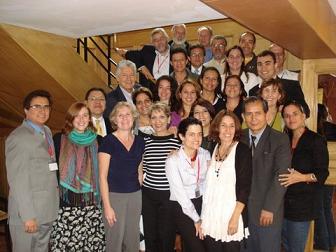 To rethink Health, from an International Health perspective, was the challenge that more than thirty ibero-american experts and officers from the Pan-American Health Organization (PAHO/WHO) took in the city of Lima, these past 8, 9 and 10 October 2009.
To rethink Health, from an International Health perspective, was the challenge that more than thirty ibero-american experts and officers from the Pan-American Health Organization (PAHO/WHO) took in the city of Lima, these past 8, 9 and 10 October 2009.
The participants in the gathering, conveyed by the Programme ‘Leaders on International Health – Edmundo Granda Ugalde’ (PLSI in Spanish) of the Pan-American Health Organization (PAHO/WHO) theorized on what could developed to be a new concept approach for International Health, which is conceived today as an obligated field of study and practice. They shared the advancements presented by the PLSI on ten programmes developed by Public Health Schools from Canada, México, Colombia, Peru, Argentina, Brazil, Cuba, Chile and the United States.
This meeting was a follow-up on the ‘I Reflection and Analysis Workshop on the Concept Bases of International Health’ held in October 2008 in Medellin, Colombia, where the first set of bases were established to reflect and discuss about a new approach for International Health seventeen years after the publication of the book ‘International Health: A North – South Debate’ which revealed striking thought discrepancies among countries, and stressed the need to discard the assisting model to move towards one of collaboration and cooperation.
Acknowledging the complexity of the current context and the implication of phenomena such as globalization, world geopolitics transformation, health determinants’ evolution, shifts of power and influence (conflict, commerce, international affairs and development models) which impact health, both the meetings in Medellin and Lima proposed reviewing again the international health concept to build a new model which is more solid and has a greater comprehension capacity of the health and sickness processes within an international dimension.
Among the agreements of the Lima meeting called ‘II Workshop: Towards a new construction of the Concept Model for International Health’, the experts concluded that the practices of the global health/international health programmes of the region presented more similarities than differences: a shift in governance forces is evident with more openness for social actors participation, and more attention is given to international affairs and agreements between the countries to confront the new health challenges. On the other hand the importance of promoting network information and experiences exchanges among the participating academic institutions of the PLSI was highlighted, aiming at strengthening international/global health, at its theoretical conception as well as in its practice.
Another of the agreements reached was the publication of a new book which gathers and systematizes the debates, contributions and proposals in order to describe the evolution of International Health and thus come closer to a new definition of its concept model with a XXI Century focus. It is expected also that this publication generates input which may enable the constant updating of the PLSI which, promoted by the PAHO, advocates on the capacity strengthening of human resources of the region’s countries to understand, act and influence positively on international health determinants, promote its interests and convey inter-sector and international actions.
For more information:

